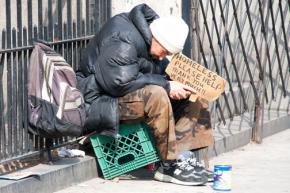Students for housing justice
reports on the actions of NYU students fighting for housing rights.
ACTIVISTS in New York University's (NYU) Students for Economic Justice (SEJ) are searching for solidarity in their campaign to pressure the university to cut all financial ties with JPMorgan Chase until or unless Chase halts its predatory foreclosures and recognizes housing as a human right.
The campaign commenced last year around the start of Occupy Wall Street and has since been committed to promoting a housing system based on human rights principles. Despite even the minimal efforts of the Department of Housing and Urban Development's 2010 Emergency Homeowner Loan Program (EHLP) and other programs designed to help underwater homeowners negotiate mortgages with banks, JP Morgan Chase granted loan modifications to a meager 6 percent of applicants.
Communities of color have overwhelmingly been denied the right to stay in their homes and were 175 percent more likely than the general population of homeowners to have received a pre-foreclosure notice between December 2009 and December 2010.

NYU's relationship to Chase is ambiguous at best. The bank handles wire transfers, administers faculty pension plans, issues purchasing cards for departmental use, and has previously issued bonds for NYU. Chase profits from the tuition dollars of the university's students in numerous ways. However, the full extent of the relationship between the bank and the university is relatively unknown due to the lack of transparency.
In response, last year, members of Student for Economic Justice (previously known as NYU for Occupy Wall Street) delivered a letter to university President John Sexton, explaining their discontent with the university's financial ties with a human rights abuser. The president did not respond and has made no efforts to demystify or address student dissatisfaction with the issue. Since then, the SEJ has been mobilizing students around campus through rallies, petitions, and teach-ins to pressure the university to respond.
A RECENT public forum hosted by SEJ entitled "Evict Chase: Housing is a Human Right" focused on student movements and their relationship to the foreclosure crisis. Members of New York Communities for Change, the Poverty Initiative, and a faculty member of the University openly denounced the role of capitalism and market fundamentalism in the displacement of the poor.
With the concept of housing as a human right as the entry point for discussion, the speakers reminded the audience about the power and significance of student movements throughout history.
The power of the forum lay in its ability to note the connection between students and the recent economic downfall. As noted by Willie Baptist, a keynote speaker and a member of the Poverty Initiative, when victims of capitalism were reduced to "homeless people" by the media, government officials created a discourse of homelessness that strategically labeled certain populations as deficient due to their incapability to "keep up" with neoliberalism and the fluctuating U.S. economy.
Entrance into the "real world" will be a surprising shock for many graduates, who have invested roughly $250,000 into NYU over the past four years. With one of the highest instances of student debt and the worst financial aid at any university in the United States (according to a report by the Princeton Review), NYU has amended the sad reality of living a paycheck away from homelessness, to living a diploma away from homelessness.
That is why SEJ seeks solidarity in their campaign to evict one of the leading forces of the foreclosure crisis from the university.
Some argue that the campaign is unreasonable, especially considering the fact that the CEO of JPMorgan Chase is a member of the board of trustees of NYU's medical school. These arguments ignore similar campaigns launched by students at both Cornell University and University of Washington that successfully terminated contracts between the university and corporations deemed unethical.
SEJ is fighting for JPMorgan Chase to provide principle reductions--lowering the amount a homeowner owes on a mortgage before interest. This would allow thousands of New Yorkers to continue living in their homes, rather than being foreclosed on.
During the recession, the price of homes diminished and many people found that they now owe more than their home is actually worth. Principle reductions would thus lower the cost of the homes to more accurately reflect their current value.
While SEJ sees the principle reduction as a step forward, their primary vision is to promote a system that views housing as a basic human right rather than a commodity. Not only will it provide more affordable housing to many New Yorkers, but it will also prove that students can be a part of the fight against Wall Street, and will not stand aside as their education is connected to unethical and racist banking practices.


